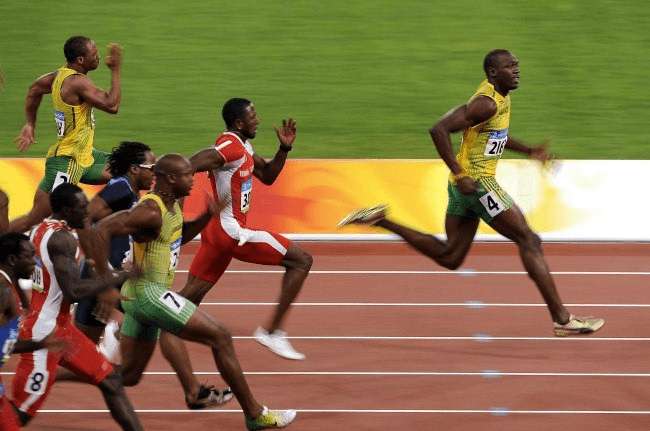Principle
What is this health component of fitness?

Cardiorespiratory Endurance
What is the skill component?

Speed
What are some of the common barriers to physical activity / exercise?
Lack of motivation, lack of energy, time, money/cost, and access to facilities.
What does the F.I.T.T Principle stand for?
Frequency, Intensity, Time and Type.
The percentage of body weight that is made up of fat when compared to your other tissues, such as bones and muscles.
Body Composition
The 12-minute run measures..
Cardiorespiratory Endurance AND Aerobic Endurance/power.
Agility is defined as
The ability to change direction quickly with speed and balance.
What is a strategy to overcome the cost barrier of exercise and physical activity?
Use free facilities like outdoor gyms, exercise outdoors, including physical activity in your daily routine e.g. walking to school or walking to the next bus stop to increase your daily steps, download free apps, use youtube to guide your workouts.
The F.I.T.T. principle details how to safely and effectively progress what style of workout?
Inclusive of all - Muscular endurance, Muscular Strength, and cardiorespiratory endurance.
Balance is defined as
The ability to control our center of gravity while stationary or moving
Muscular Strength is …...
the ability of muscles to exert force.
Vertical jump and standing long jump are fitness tests measuring ……
Muscular Power
Why are transport and Technology barriers to physical activity for children aged 12-18 years?
Transport - Many children may not have access to transport in which they can get themselves to and from an exercise facility such as a gym. Children may rely on their families and parents to travel places.
Technology - today technology offers exceptional access to workouts, gym routines etc however not all children have the same accessability to technology.
The time aspect of the FITT principle refers to:
How long the duration of your exercise will be.
For example, you may exercise for 45 - 60 mins
What does the SMARTER goals acronym stand for?
Specific, Measurable, Attainable, Realistic, Time, Evaluate and Reward.
What is the definition of the health component shown in the picture?
Muscular endurance is the ability of the muscles to endure physical work for extended periods of time without fatigue.
Well, ___________ players are less prone to accidents and injury when involved in physical activity.
Answer: Coordination
coordinated
Why do our barriers to exercise change as we get older?
One’s lifestyle, responsibilities, and priorities change. As we enter the workforce, you can afford to pay for a gym membership or facilities.
What is one way you can measure the intensity of your exercise?
MHR, Target Heart Rate, RPE (Rate of perceived Exertion), or the talk test.
Why would an elite coach use physical fitness tests within his training program?
- to identify strengths and/or weaknesses in a performance/the success of a training programme.
- to monitor improvement
- to show a starting level of fitness.
An improvement in health-related fitness components improves personal health and lifestyle, including lowering the risk of diseases such as:
heart disease, obesity, high blood pressure, insomnia, diabetes, depression, and cancer.
What are the two types of Balance?
Static and Dynamic
How long should teens exercise daily?
Children and adolescents ages 6 through 17 years should do 60 minutes (1 hour) or more of moderate-to-vigorous intensity physical activity each day, including daily aerobic – and activities that strengthen bones (like running or jumping).
How does exercise intensity affect your heart rate?
When you exercise, your heart beats faster to meet the demand for more blood and oxygen by the muscles of the body. The more intense the activity, the faster your heart will beat. Therefore, monitoring your heart rate during exercise can be an excellent way to monitor exercise intensity.
Discuss whether you think that your level of fitness predicts your performance outcome?
Fitness shows how high a level of performance can be, but it doesn’t include all the skill levels of that person which may be more important for certain sports and activities than the actual fitness aspect.
Someone with average fitness and a moderate skill level may do better than someone in performance than someone with a high level of fitness but not much skill.